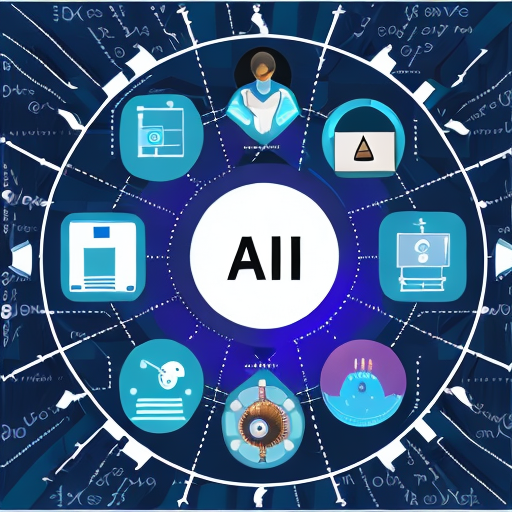Artificial Intelligence Filter is a game-changer in data management. It helps to identify and action on important data insights in a timely manner, making it a powerful tool for decision making.
Understanding Artificial Intelligence Filter and Their Impact on Data Management

The way we manage data is changing, and artificial intelligence (AI) is playing a big role in that change. One of the most significant changes AI is bringing to data management is the way we filter data.
In the past, data was filtered manually. This was a time-consuming and often error-prone process. AI is changing that by automating the data filtering process.
AI-powered data filters are able to quickly and accurately identify relevant data. This means that we can spend less time sifting through data and more time using it to make decisions.
AI data filters are also able to learn and adapt over time. As they are exposed to more data, they become more effective at identifying relevant information.
There are a number of different AI data filters available, each with its own strengths and weaknesses. The right data filter for you will depend on your specific needs.
Some of the most popular AI data filters include:
Google Cloud Natural Language: This filter is designed to identify the meaning of text. It can be used to filter data from sources such as social media, customer reviews, and support tickets.
IBM Watson Discovery: This filter uses a combination of machine learning and natural language processing to identify relevant data. It is often used in e-discovery applications.
Microsoft Azure Text Analytics: This filter uses a variety of techniques, including natural language processing and text classification, to identify relevant data.
AWS Comprehend: This filter uses natural language processing to identify the meaning of text. It can be used to filter data from sources such as social media, customer reviews, and support tickets.
The benefits of using AI to filter data are clear. However, there are also some potential drawbacks to consider.
One potential issue is that AI data filters can be biased. This is because they are often trained on data that is itself biased. For example, if an AI data filter is trained on customer reviews, it may learn to preferentially select positive reviews.
Another potential issue is that AI data filters can be opaque. This means that it can be difficult to understand how the filters are making decisions about which data to include or exclude. This lack of transparency can lead to biases and errors in the filtering process, which can in turn affect the accuracy and fairness of AI systems that rely on filtered data. It is important for developers to prioritize transparency and explainability in AI data filtering processes to ensure that these systems are trustworthy and equitable.
How Artificial Intelligence Filter are Revolutionizing Data Analysis

The technology sector is rapidly evolving and the term ‘artificial intelligence’ (AI) is now commonplace. Businesses are under pressure to harness AI and use it to their advantage or risk being left behind. But what is AI and, more importantly, how can it be used to benefit businesses?
In its broadest sense, AI can be defined as a computer system that has been designed to carry out tasks that would normally require human intelligence, such as pattern recognition and natural language processing.
There are different types of AI, but the two main categories are weak AI and strong AI. Weak AI is also known as narrow AI or applied AI. It is designed to carry out specific tasks, such as playing chess or driving a car. Strong AI, on the other hand, is also known as general AI or artificial general intelligence. It is a computer system that has been designed to carry out any task that a human being is able to do.
At present, weak AI is the most common type of AI and it is being used in a variety of different ways, including:
– Automated customer service: Customers can now interact with computer systems that have been designed to understand and respond to natural language.
– Fraud detection: AI is being used to help identify fraudulent activity, such as unusual patterns of behavior that may indicate that a customer is trying to defraud a company.
– Predictive maintenance: AI is being used to carry out predictive maintenance, which is a form of maintenance that is carried out before a problem arises. This can help to improve the efficiency of a company and reduce the chances of equipment breaking down.
– Sales and marketing: AI is being used to help companies target their sales and marketing efforts more effectively. For example, by analyzing customer data, AI can be used to identify potential customers and target them with personalized messages.
– Self-driving cars: AI is playing a key role in the development of self-driving cars. By using sensors and cameras, AI systems are able to detect and respond to their surroundings, which allows them to navigate without the need for a human driver.
The above examples show that AI is already having a significant impact on various industries and aspects of our daily lives. From healthcare to finance to transportation, AI is being used to streamline processes, make predictions, and improve decision-making. However, as with any new technology, there are also challenges and potential risks associated with AI, such as biases and lack of transparency. It is important for developers, policymakers, and society as a whole to continue to monitor and address these issues as AI continues to evolve and become more integrated into our lives.
Streamlining Data Management with Artificial Intelligence Filter

Data management is a critical part of any business. It involves collecting, storing, and processing data. The goal is to turn data into insights that can be used to make better decisions.
Artificial intelligence (AI) is a game-changer in data management. AI can help you filter data more efficiently and effectively. It can also help you make better decisions by providing insights that you may not have otherwise considered.
There are a few things to keep in mind when using AI to manage data:
1. Know your data. Before you can effectively filter your data, you need to understand it. Know where it comes from, what it represents, and how it can be used.
2. Set up your filters. AI can help you filter data in a variety of ways. You can use it to identify patterns, outliers, and trends. You can also use it to make predictions.
3. Test your filters. Once you’ve set up your filters, it’s important to test them. Make sure they’re working as intended and that they’re providing the insights you need.
4. Adjust your filters as needed. As your data changes, so too will your filters. Be sure to adjust your filters as needed to ensure they’re always providing the most accurate and actionable insights.
Using AI to filter data is a powerful way to improve your data management. By understanding your data, setting up filters, and testing them, you can make sure you’re always getting the most out of your data.
The Benefits of Using Artificial Intelligence Filter for Data Filtering and Analysis

We all know that data is important. It helps businesses make informed decisions, understand their customers better, and improve their products and services. But data also comes with a lot of noise. This is where artificial intelligence (AI) filters come in.
AI filters are a game-changer in data management. They help businesses sift through all the noise and get to the data that matters. Here are some of the benefits of using AI filters for data filtering and analysis:
1. AI filters can process large amounts of data quickly and efficiently.
2. AI filters can identify patterns and correlations that humans might miss.
3. AI filters can make predictions and recommendations based on the data.
4. AI filters can help businesses automate their data filtering and analysis processes.
5. AI filters can improve the accuracy of data filtering and analysis.
6. AI filters can help businesses save time and resources.
7. AI filters can help businesses make better decisions.
8. AI filters can help businesses improve their products and services.
9. AI filters can help businesses stay ahead of the competition.
10. AI filters can help businesses protect their data.
AI filters are a powerful tool that can help businesses in a variety of ways. If you’re not using AI filters for data filtering and analysis, you’re missing out on a lot of benefits.
Exploring the Role of Artificial Intelligence Filter in Modern Data Management

The role of artificial intelligence (AI) in data management has been receiving a lot of attention lately. And for good reason: AI has the potential to transform the way we manage and use data.
One of the most exciting applications of AI in data management is the development of AI-powered filters. These filters can help us sift through large data sets to find the information we need.
AI-powered filters are already being used in a number of different industries. For example, in the healthcare industry, AI-powered filters are being used to identify which patients are at risk for certain diseases. In the financial industry, AI-powered filters are being used to identify fraudulent transactions.
The use of AI-powered filters is not limited to these industries. AI-powered filters can be used in any industry where there is a need to sift through large data sets to find relevant information.
There are a number of benefits of using AI-powered filters in data management. First, AI-powered filters can help us save time. Sifting through large data sets manually can be a time-consuming process. AI-powered filters can do it for us in a fraction of the time.
Second, AI-powered filters can help us make better decisions. By sifting through data and identifying patterns, AI-powered filters can help us make informed decisions that we might not be able to make on our own.
Third, AI-powered filters can help us automate repetitive tasks. For example, if we are constantly sifting through data to find a certain type of information, we can train an AI-powered filter to do it for us. This can free up our time so that we can focus on more important tasks.
Fourth, AI-powered filters can help us improve the accuracy of our data. By identifying errors and inconsistencies in data, AI-powered filters can help us clean up our data and make it more accurate.
The benefits of using AI-powered filters in data management are clear. AI-powered filters can help us save time, make better decisions, automate repetitive tasks, and improve the accuracy of our data. As the use of AI in data management continues to grow, we can expect even more advanced applications and benefits. For example, AI can help identify patterns and anomalies in data that humans may not be able to detect on their own, leading to more insightful analysis and predictions. Additionally, AI can assist in data privacy and security measures by detecting and flagging potential breaches or threats. However, it is important to ensure that AI is used ethically and responsibly in data management, with appropriate consideration for privacy, transparency, and bias. By doing so, we can maximize the benefits of AI while minimizing potential risks and drawbacks.
Harnessing the Power of Artificial Intelligence Filter for Efficient Data Filtering and Processing
The harnessing of artificial intelligence (AI) for efficient data filtering and processing is one of the most significant recent developments in the field of data management. This is because AI-based filters can be used to automatically identify and extract relevant information from large data sets, thereby reducing the need for manual data processing.
AI filters are already being used in a number of different sectors, including healthcare, finance, and retail. For example, AI-based filters are being used to identify and track fraudulent financial transactions, to automatically detect and diagnose diseases, and to recommend products to customers based on their past purchase history.
There are a number of different types of AI filters, including rule-based filters, decision tree filters, and neural network filters. Rule-based filters rely on a set of predetermined rules to identify relevant information, while decision tree filters use a series of if-then-else statements to identify relevant information. Neural network filters, on the other hand, are able to learn and adapt to new data sets, making them especially well-suited for data filtering and processing applications.
AI filters offer a number of advantages over traditional data filtering and processing methods. First, AI filters can be used to automatically identify and extract relevant information from large data sets, thereby reducing the need for manual data processing. Second, AI filters can be used to identify patterns and trends that would be difficult to spot using traditional methods. Finally, AI filters can be used to make predictions about future events, trends, and behaviours.
AI filters are already having a transformative effect on the field of data management and are likely to have even more far-reaching implications in the future. As data sets continue to grow in size and complexity, AI filters will become increasingly essential for efficient data filtering and processing.
Implementing Artificial Intelligence Filter in Your Data Management Strategy
Artificial Intelligence Filter: A Game-Changer in Data Management
The data is the new oil. As the world moves towards digitalization, the importance of data is only increasing. In fact, according to a report by IBM, 2.5 quintillion bytes of data are generated every day. And this number is only set to increase in the future.
With so much data being generated, it is becoming increasingly difficult to manage it all. This is where artificial intelligence comes in. AI can help organizations filter out the noise and focus on the data that is most important to them.
AI-powered data management can help organizations in a number of ways. For one, it can help them identify patterns and trends in their data. This, in turn, can help organizations make better decisions. Additionally, AI can also help organizations automate their data management processes. This can free up time and resources that can be better used elsewhere.
Implementing AI in data management can be a game-changer for organizations. It can help them save time, resources, and money. Additionally, it can also help them make better decisions. If you are looking to implement AI in your data management strategy, there are a few things you need to keep in mind.
First and foremost, you need to have a clear understanding of your data. This will help you determine which AI tools are best suited for your needs. Additionally, you also need to have a clear idea of your goals and objectives. Only then will you be able to implement AI in a way that is most beneficial to your organization.
Once you have a clear understanding of your data and your goals, you need to select the right AI tools. There are a number of AI tools available on the market. Select the ones that are most suitable for your needs.
Once you have selected the right AI tools, you need to implement them in the right way. This is where most organizations fail. They either do not have the right expertise or they do not implement the tools in the right way. As a result, they do not get the desired results.
If you want to get the most out of AI, you need to make sure that you have a clear understanding of what you want to achieve and what data you need to achieve it. This involves defining your objectives and identifying the relevant data sources, as well as understanding any limitations or biases in the data. Additionally, it is important to have the right expertise and resources in place to implement and maintain AI systems, including data scientists, engineers, and IT professionals. Finally, ongoing monitoring and evaluation are essential to ensure that AI is achieving the desired outcomes and to identify any necessary adjustments or improvements. By taking a strategic and thoughtful approach to AI, organizations can harness its full potential to drive innovation, improve efficiency, and create value.
Maximizing the Potential of Artificial Intelligence Filter for Improved Data Management
Artificial Intelligence (AI) is a game-changer in data management. It has the potential to revolutionize the way we manage data by automating tasks that are currently performed manually.
For example, consider a scenario where you have to analyze a large dataset. AI can help you automatically identify patterns and trends in the data, which would otherwise be extremely time-consuming and difficult to do manually.
Similarly, AI can also be used to automatically generate reports based on data. This can help you save a lot of time and effort that would otherwise be spent on manually creating reports.
AI can also be used to improve the accuracy of data. For instance, if you have a dataset with a lot of missing values, AI can be used to impute the missing values. This can help you avoid the errors that can occur when data is manually entered into a system.
Overall, AI has the potential to greatly improve the efficiency of data management. It can automate tasks that are currently performed manually, and improve the accuracy of data.
Leveraging Artificial Intelligence Filter to Enhance Data Security and Privacy
The term “data security” and “privacy” are often used interchangeably, but they are two distinct concepts. Data security is the practice of protecting data from unauthorized access, while data privacy is the practice of safeguarding personal information. Both are important for businesses that handle sensitive information, but data privacy is especially relevant in the age of big data and artificial intelligence (AI).
AI is increasingly being used to filter and analyze data, which has led to concerns about the potential for misuse. For example, facial recognition technology can be used to identify individuals in a crowd, but it can also be used for more nefarious purposes such as identity theft or stalking. Similarly, AI-powered chatbots can be used to provide customer service, but they can also be used to collect sensitive information such as credit card numbers or passwords.
businesses need to be aware of the risks associated with AI and take steps to protect their data. One way to do this is to use an AI filter.
An AI filter is a piece of software that is designed to identify and remove sensitive information from data sets. For example, a chatbot that is powered by AI may be programmed to filter out credit card numbers or social security numbers. This can help to protect businesses from data breaches and safeguard customer privacy.
AI filters can also be used to protect businesses from liability. For example, if a chatbot is programmed to filter out profanity, it can help to avoid potential lawsuits for defamation or harassment. Similarly, if a facial recognition system is programmed to filter out images of people who are not authorized to be photographed, it can help to avoid privacy violations.
AI filters are not perfect, but they can be an effective tool for protecting data. businesses that handle sensitive information should consider using an AI filter to enhance their data security and privacy.
The Future of Data Management: How Artificial Intelligence Filter are Shaping the Landscape
The Future of Data Management: How Artificial Intelligence Filters are Shaping the Landscape
Data management is an essential part of any business, yet it can be a challenge to keep up with the ever-changing landscape. In recent years, artificial intelligence (AI) has emerged as a game-changer in data management, providing new ways to filter and analyze data. Next Generation Data Management: Using Your Data Assets to Drive Mission Success
As businesses become more data-driven, the need for AI in data management will only continue to grow. Here’s a look at how AI filters are shaping the future of data management:
1. AI Filters Can Help You Make Better Decisions
One of the biggest benefits of AI filters is that they can help you make better decisions. By analyzing data more effectively, AI filters can help you identify patterns and trends that you may not have noticed before.
This can be extremely helpful in a number of different situations, from deciding which products to stock in your store to choosing which marketing campaigns to run. AI filters can help you make better decisions about virtually anything that involves data.
2. AI Filters Can Help You Save Time
Another big benefit of AI filters is that they can help you save time. Rather than spending hours sifting through data yourself, you can let AI filters do the work for you.
This can free up your time so that you can focus on other aspects of your business. It can also help you make decisions more quickly, which can be a major advantage in fast-paced industries.
3. AI Filters Can Help You Reduce Costs
In addition to saving time, AI filters can also help you reduce costs. By making better decisions, you can avoid wasting money on things like unnecessary inventory or unproductive marketing campaigns.
AI filters can also help you automate tasks that would otherwise be done manually. This can further reduce your costs by eliminating the need to pay someone to do these tasks.
4. AI Filters Can Help You Stay Ahead of the Competition
As more businesses begin to use AI filters, those that don’t will be at a disadvantage. AI filters will give businesses that use them a major competitive edge.
If you want to stay competitive in today’s rapidly evolving business landscape, it is essential to embrace the latest technologies and tools, including AI filters. As more and more businesses begin to adopt AI filters, those that do not will be at a disadvantage, as they may not be able to keep up with the efficiency and accuracy gains achieved by their competitors. AI filters can help businesses streamline operations, reduce costs, and make better decisions based on data-driven insights. By harnessing the power of AI filters, businesses can gain a major competitive edge, enabling them to stay ahead of the curve and succeed in the marketplace. However, it is important to implement AI filters responsibly, with appropriate consideration for issues such as privacy, transparency, and bias, in order to ensure that the benefits of AI are realized without any negative consequences.







